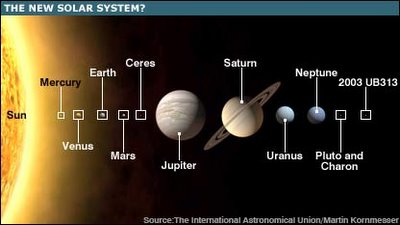Off course conspiracy theorists (no shortage of those) could argue this latest change was funded by an international lobby of printers, already rubbing their hands and licking their lips thinking about the profits from printing new textbooks, dictionaries and encyclopedias, but I think there is nothing sinister about it.
It just proves that science is alive and kicking, thank you very much. And it can still change our world.
Sure, the Solar System hasn’t actually changed. Apart from the regular movements of its comets, asteroids and planets it is exactly where it was a few days ago. We cannot change the laws of nature, but we can and do change what we know and how we interpret it. We do change our perception. And that’s the wonderful thing. It shows us that no system created by man is everlasting and impervious to change no matter how used to it we’ve become. Sooner or later we learn something new, circumstances change, reality kicks in, and we have to accept it and move on.
This change of cosmic proportions will hopefully trickle down through space, carried by solar winds, and our gravity will pull it down to a global, continental, regional or local level. Nothing lasts forever. Isn’t it a relief? Whether it’s religious dogma or American foreign policy or the Serbian government or international borders. And still life goes on.
This latest Solar System enlargement has given a chance to some new heavenly bodies to have their time in the spotlight. And there are more candidate planets hoping to meet the criteria for admission. Our ever changing neighborhood gives hope even to those of us living in the Kuiper belt of Europe that our time might come.
Another thing we can learn is the power of compromise. Pluto got its final status, and it’s, well, less than a classical planet more than an asteroid. Some things you lose, some thing you win, it lost its moon but gained a twin planet and got to be the reference point for other planets. And I’m sure the Plutonians don’t mind.

For a serious text on the subject: BBC
1 comment:
I'm also interested in these subjects. On a related point what do you think about the prospects of a manned mission to mars? I mean do you think it will happen before EU membership or after :)
Post a Comment